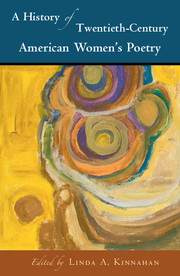Book contents
- Frontmatter
- Contents
- List of figures
- List of contributors
- Preface
- Acknowledgments
- PART I MAPPINGS AND CHRONOLOGIES
- PART II ETHNICITY, RACE, AND IDENTITY
- PART III MATERIAL FORMATIONS
- 10 The World Split Open: Feminism, Poetry, and Social Critique
- 11 Little Magazines and the Gendered, Racialized Discourse of Women's Poetry
- 12 The WP Network: Anthologies and Affiliations in Contemporary American Women's Poetry
- 13 High, Low, and Somewhere In-Between: Women's Poetry and Popular Culture in Modern America
- 14 “At the Edge of What We Know”: Gender and Environment in American Poetry
- PART IV LINEAGES, TIES, AND CONNECTIONS
- PART V FORM, LANGUAGE, AND TEXT
- PART VI CODA
- Bibliography
- Index
11 - Little Magazines and the Gendered, Racialized Discourse of Women's Poetry
from PART III - MATERIAL FORMATIONS
Published online by Cambridge University Press: 05 June 2016
- Frontmatter
- Contents
- List of figures
- List of contributors
- Preface
- Acknowledgments
- PART I MAPPINGS AND CHRONOLOGIES
- PART II ETHNICITY, RACE, AND IDENTITY
- PART III MATERIAL FORMATIONS
- 10 The World Split Open: Feminism, Poetry, and Social Critique
- 11 Little Magazines and the Gendered, Racialized Discourse of Women's Poetry
- 12 The WP Network: Anthologies and Affiliations in Contemporary American Women's Poetry
- 13 High, Low, and Somewhere In-Between: Women's Poetry and Popular Culture in Modern America
- 14 “At the Edge of What We Know”: Gender and Environment in American Poetry
- PART IV LINEAGES, TIES, AND CONNECTIONS
- PART V FORM, LANGUAGE, AND TEXT
- PART VI CODA
- Bibliography
- Index
Summary
The first decades of the twentieth century witnessed a poetry boom so extraordinary that the New York Times headlined “Poetry as a Major Popular Sport” and the New York Tribune reported: “Lately in America the product of poetry has grown to such proportions that it has come to be a common saying that everybody writes poetry.” The “New Poetry” movement was fueled by a transatlantic wave of little magazines dedicated to the genre: in 1912, Harold Monro founded the Poetry Review in London, Harriet Monroe launched Poetry from Chicago, and William Stanley Braithwaite issued the Poetry Journal from Boston. Soon little magazines with a more experimental ethos opened their pages to modern poetry, including The New Freewoman (1913), Little Review (1914), and Others (1915). Surveying the burgeoning poetry field, the Tribune reported that a “notable feature of the movement is the early prominence taken in it by women. Two, at least, of the best known leaders are women, Miss Amy Lowell and Miss Monroe, and … two of the five contributors to the first number of ‘Others’ are women.” Not coincidentally, the two journalists reporting for the Times and the Tribune were also women: Helen Bullitt Lowry and Margaret Johns. The rise of little magazines made conditions more propitious for American women writers than ever before.
Little magazines are typically low-budget, small circulation, short-lived journals, dedicated to publishing new ideas, innovative art and literature, and unknown writers. These unconventional magazines “made modernist poetry possible” by providing a public stage for experimentation and modernization of the genre. Offering an alternative to the normative white, male-directed, profit-driven culture of mass-market magazines, little magazines also gave women of diverse race, class, and national affiliations unprecedented authority, visibility, and voice, allowing them to assume leading roles in the New Poetry movement, the New Negro movement, and other twentieth-century avant-garde movements.
- Type
- Chapter
- Information
- A History of Twentieth-Century American Women's Poetry , pp. 170 - 185Publisher: Cambridge University PressPrint publication year: 2016



